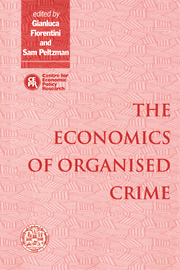Book contents
- Frontmatter
- Contents
- List of figures
- List of tables
- Foreword
- Acknowledgements
- List of conference participants
- 1 Introduction
- PART I THEORIES OF THE STATE AND THE ORIGIN OF CRIMINAL ORGANISATIONS
- PART II THE CRIMINAL ORGANISATION AS A FIRM
- PART III ORGANISED CRIME AND STATE INTERVENTION IN THE ECONOMY
- PART IV DETERRENCE POLICIES AGAINST LEGAL FIRMS INVOLVED IN ILLEGAL ACTIVITIES
- 8 Auditing with ‘ghosts’
- Discussion
- 9 The reputational penalty firms bear from committing criminal fraud
- Discussion
- PART V DETERRENCE POLICIES AGAINST ORGANISED CRIME
- Index
9 - The reputational penalty firms bear from committing criminal fraud
Published online by Cambridge University Press: 04 August 2010
- Frontmatter
- Contents
- List of figures
- List of tables
- Foreword
- Acknowledgements
- List of conference participants
- 1 Introduction
- PART I THEORIES OF THE STATE AND THE ORIGIN OF CRIMINAL ORGANISATIONS
- PART II THE CRIMINAL ORGANISATION AS A FIRM
- PART III ORGANISED CRIME AND STATE INTERVENTION IN THE ECONOMY
- PART IV DETERRENCE POLICIES AGAINST LEGAL FIRMS INVOLVED IN ILLEGAL ACTIVITIES
- 8 Auditing with ‘ghosts’
- Discussion
- 9 The reputational penalty firms bear from committing criminal fraud
- Discussion
- PART V DETERRENCE POLICIES AGAINST ORGANISED CRIME
- Index
Summary
Introduction
Optimal penalties for corporate fraud require that firms face expected penalties equal to the total social costs of the crime. Yet formal courtimposed sanctions for committing fraud often represent a small fraction of the damage produced by the fraud. Sheer and Ho (1989), for example, estimate that the median and mean ratios of criminal fines to the private loss from private fraud were 0.14 and 0.73 in 1988. The corresponding median and mean ratios for government procurement fraud were 0.29 and 1.60. Including criminal restitution raises the median dollar sanction-to-loss ratio for private fraud to 0.84 and for government procurement fraud to 0.68. These ratios are for private parties convicted of fraud. The ratio of the expected court-imposed penalty to the social cost of the fraud is undoubtedly smaller. Particularly when compared to other crimes such as environmental pollution, where the median ratio of criminal fines to private loss is 3.71, the penalty for fraud seems surprisingly low.
The perceived underpunishment of corporate frauds has recently affected public policy. Reflecting popular opinion that existing penalties were too low, the US Sentencing Commission – the federal agency responsible for setting the penalty guidelines used by judges – established corporate sentencing guidelines in 1991 that raised median corporate fraud penalties by over twentyfold.
This article criticises the conventional wisdom about corporate fraud in two ways. First, we explain that the typical optimal criminal penalty for private corporate fraud is small because the external effects of such frauds are usually small. An increase in criminal penalties for corporate fraud can do more harm than good because it encourages the substitution of criminal penalties for reputation as a mechanism to police fraudulent behaviour.
- Type
- Chapter
- Information
- The Economics of Organised Crime , pp. 199 - 245Publisher: Cambridge University PressPrint publication year: 1996
- 1
- Cited by



